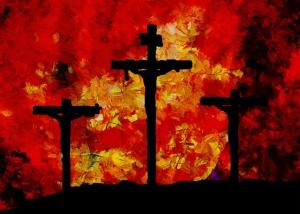
“Amen, amen, I say to you, whoever keeps my word will never see death.” – John 8:51.
Every Catholic, indeed every person who has ever professed faith in God, has died. Many of those, Catholics and non-Catholics alike, have suffered greatly. How do we reconcile the suffering and death of so many faithful with the belief that God has saved us? Formulated differently, is it possible to speak meaningfully of salvation if suffering and death remain ever present to us?
In this paper, I will argue that the existence of suffering and death do not preclude salvation. To do this, I will examine the nature of sin and the meaning of salvation in the context of Catholic theology.
Sin is “a word, deed or desire in opposition to the eternal law.” (Saint Augustine). In turn, the eternal law is the mind of God. Because sin can be placed within the greater context of evil, and evil is a lack of a good that ought to be present, sin can also be understood as a privation of virtue.
Violations of the laws of man have consequences, and so too do the laws of God. If we see sin as a violation of God’s laws, we can expect sin to have consequences. Scripture tells us that one such consequence of sin is death. (See Romans 6:23). Moreover, since all have sinned (Romans 3:23), all human beings are subject to death. Making matters even more grave is the fact that humans cannot save themselves. Since sin is an act against an infinite God, finite humans are incapable of providing recompense for sin.
In a sense, God’s efforts to rescue mankind from sin is what salvation is all about. For this reason, the Bible depicts several efforts by God to reconcile Himself with human beings, culminating in Christ. Because Jesus Christ is both God and man, He is in the unique position to be able to effect salvation. By taking upon Himself our sin, Christ paid the price for the cost of that sin. By His Resurrection, Christ provides a path to restoring human beings to the justification lost by original sin. (See Romans 4:25).
So far, so abstract, but what does it mean for the individual Catholic? What does it mean to be saved? Catholicism’s relationship with salvation is somewhat complex. This complexity is primarily due to two different, though related, topics.
First, salvation is a process, and only those who “Endure to the end will be saved.” The second point is the very controversial teaching of the Church vis-a-vis “work” and salvation. Perhaps “work” is the wrong word; we are to cooperate with God in our salvation, and this cooperation most efficaciously takes place in the sacraments. We cannot save ourselves; we can, however, cooperate with the process that leads to our salvation. (See Matthew 7:21).
The above provides the foundation for the question at hand. If death and the attendant suffering are the result of sin, and if Christ has saved us from sin, why do the faithful still suffer and die? There are several ways to address this question. First, it is essential that we clarify a significant misunderstanding about death, which in turn requires an understanding of life.
All living things are composed of a spiritual soul and a material or physical body. Because a body is composed of parts, it is subject to corruption (suffering) and death. This process is entirely natural. What is not natural, what Christ came to save us from, is what the Bible calls “the second death.”
The term second death appears several times in the Book of Revelation. For the sake of brevity, I will simply define the second death as the eternal separation of the soul from God. Some authorities suggest that the second death involves the destruction of the soul. Regardless, the “second death” is distinguished from the more familiar concept of death, which is the separation of the soul from the body.
All of this rests on the fact of the Resurrection of Christ. Christ was laid in a tomb and covered by a large stone. The stone, metaphorically speaking, separates the dead from the living. By His Resurrection, not only was the tomb’s stone thrust aside, but the very gates of Heaven were opened. No longer does death mean separation from God, but rather death means to be “away from the body and at home with the Lord.” (See 2 Corinthians 5:8).
Thus far, I have sought to explain the Catholic concepts of salvation and death. Accepting that Christ has saved us from the effect of sin (i.e., the second death), one problem remains. Yes, Christ has saved me from my sins; yes, He has made it possible for me to spend eternity in Heaven, but why must I suffer in this life? There are two aspects of this.
First, we live in a fallen world. While Christ has made the salvation of the soul possible, our world remains beset by the effects of original and personal sin. “All of creation groans in pain,” Saint Paul writes. This “groaning” will only cease when creation is redeemed at the Second Coming.
The second aspect is that we can give meaning to our suffering. Or, more accurately, God has given us the ability to give meaning to pain. We can accomplish this by uniting our suffering to Jesus’ suffering on the Cross. This process, known as redemptive suffering, allows us to participate in and cooperate with our redemption.
I would like to conclude by observing that the apostles and members of the early Church believed that suffering and death were opportunities to grow closer to God. While death meant that one was “at home with the Lord,” suffering allows one to share in Christ’s Passion and, therefore, participate in our own redemption. Saint Paul put it this way, “Now I rejoice in my sufferings for your sake, and in my flesh, I complete what is lacking in Christ’s afflictions for the sake of his body, that is, the church” (Colossians 1:24). In suffering, we can, albeit limitedly, become like Christ, and is that not what being Catholic is all about?













